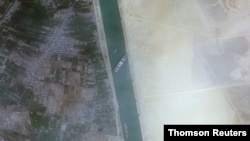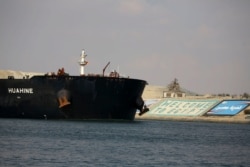Evergreen Marine Corp., the operator of the giant cargo ship that got stuck in the Suez Canal this month, normally works in a strict, top-down way that reduces the risk of mishaps, according to people familiar with the Taiwanese company.
With the ship free as of Monday afternoon after about a week of blocking a major world shipping route, authorities are turning now to reasons for the freak accident.
Any formal announcement as to who’s at fault will hinge on an investigation and could implicate the operator, the Japanese shipowner, the weather or the canal itself. In a March 24 statement, Evergreen said gusty winds of about 56 kph had caused the ship’s course to deviate.
Evergreen had been all but free of accidents before last week, company followers say. They point to the discipline of Evergreen founder Chang Yung-fa, who died in 2016 at the age of 88.
A native of a Taiwanese coastal village during Japan’s 1895-1945 colonization, Chang worked at age 18 for a Japanese shipping line in Taipei and became third officer of a Taiwanese shipper after World War II. He eventually worked as a captain and helped start a marine shipping firm with friends before establishing Evergreen Marine on his own.
Chang launched the company in 1968 with a single second-hand ship. Evergreen's operating fleet has 200 container ships today.
Chang received a Japanese education when Japan colonized Taiwan from 1895 to 1945. That education fostered a management style that thrived on strict adherence to rules and allowed employees to find work offshore, people who follow the company say.
“The former owner, Mr. Chang Yung-fa, was educated in the style of the Japanese, so his method of management was like that of Japan,” said Stone Huang, Taiwan managing director with the freight forwarding service JAS Worldwide. He works closely today with Evergreen staffers.
“So it was strict, plus his financial support was strong and a lot of the staff that turned over would go overseas,” Huang said.
Evergreen Marine, part of a transport-logistics conglomerate that includes Eva Airways, was shaken when the late founder’s sons went to court over how to divide an inheritance, domestic media outlets reported. At stake was a $1.87 billion fortune. Three sons inherited the group of companies and an employee who had risen up since 1987 now runs the marine shipping side.
The marine shipper may be playing by different rules now compared to before Chang's death, said Liang Kuo-yuan, president of the Polaris Research Institute research organization in Taipei.
“The way of operating now I believe is not as top-down as it was under the Chang Yung-fa era,” Liang said. “When Chang said something, no one wouldn’t dare not to do it.
“If he was still alive, I believe Chang would take on the whole thing himself,” Liang added, referring to the Suez Canal mishap.
Evergreen is leasing the Ever Given, the 20,000 twenty-ton equivalent cargo ship that got stuck March 23 in the canal and held up billions of dollars of freight every day. The company said its vessel was freed Monday afternoon.
Company spokespeople did not reply Monday to questions about the incident’s impact on the company’s reputation. Evergreen said in a statement Monday it would “coordinate with the shipowner to deal with subsequent matters after the shipowner and other concerned parties complete investigation reports into the incident.”
The Suez Canal upset will probably be remembered for half a year, but Evergreen Marine will do steady business because of 90% of the world’s freight moves by sea, ensuring demand, said Cathy Chin, chairperson with the Taiwan International Logistics & Supply Chain Association. The Taiwanese shipper ranks as the world’s seventh biggest by cargo carrying capacity.
Shipping industry people may eventually turn their attention to the size of the ship versus that of the 300-meter-wide Suez Canal stretch where it got stuck, Chin said. “We are thinking about, do we really need a big ship like this big vessel, because the channel has its limitations,” she said.
Cargo shipments will face delays in the short term because of the canal blockage, Huang said.





